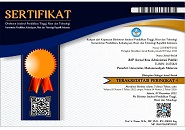Assessing E-Government User Satisfaction With Delone & Mclean Is Success Model And Digital Literacy
Abstract
Keywords
Full Text:
PDFReferences
Abdulkareem, A. K., & Ramli, R. M. (2021). Does Digital Literacy Predict E-government Performance An Extension of DeLone & McLean Information System Success Model. Electronic Government, an International Journal, 17(1), 1. https://doi.org/10.1504/eg.2021.10034963
Absharina, E. D., & Negara, E. S. (2023). Penerapan Model EUCS DAN DeLone and MCLean untuk Melihat Tingkat Kesuksesan dan Kepuasan Pengguna dalam Penerapan Aplikasi RF Mobile. In Jurnal Ilmiah Betrik (Vol. 14, Issue 03).
Alwi, Ivanisa, N. K. B., & Respati, H. T. (2023). Analisis Penggunaan Website Sistem Informasi Akademik (SIAMIK) Menggunakan Metode Delone and McLean. CHAIN: Journal of Computer Technology, Computer Engineering and Informatics86, 1(3), 86–96. https://doi.org/10.58602/chain.v1i3.45
DeLone, W. H., & McLean, E. R. (2003). The DeLone and McLean model of information systems success: A ten-year update. Journal of Management Information Systems, 19(4), 9–30. https://doi.org/10.1080/07421222.2003.11045748
Gable, G. G., Sedera, D., & Chan, T. (2008). Re-conceptualizing Information System Success: The IS-impact Measurement Model. Journal of the Association for Information Systems, 9(7), 377–408. https://doi.org/10.17705/1jais.00164
Hsu, M. H., Chiu, C. M., & Ju, T. L. (2004). Determinants of Continued Use of the WWW: An Integration of Two Theoretical Models. Industrial Management and Data Systems, 104(9), 766–775. https://doi.org/10.1108/02635570410567757
Huda, M., & Yunas, N. S. (2016). The Development of e-Government System in Indonesia. Jurnal Bina Praja, 8(1), 97–108. http://jurnal.kemendagri.go.id/index.php/jbp/index
Jaeger, P. T., & Bertot, J. C. (2010). Designing, Implementing, and Evaluating User-Centered and Citizen-Centered E-Government. International Journal of Electronic Government Research, 6(2), 1–17. https://doi.org/10.4018/jegr.2010040101
Kalakota, R., & Robinson, M. (2021). E-Business 2.0: Roadmap For Success.
Lee, K. C., & Chung, N. (2009). Understanding Factors Affecting Trust In and Satisfaction with Mobile Banking in Korea: A Modified DeLone and McLean’s model Perspective. Interacting with Computers, 21(5–6), 385–392. https://doi.org/10.1016/j.intcom.2009.06.004
Nam, H., Nam, T., & Kim, S. (2024). Identifying the Determinants of Platform-Based E-Government Service Use. Journal of Global Information Management, 32(1), 1–21. https://doi.org/10.4018/JGIM.336554
Petter, S., Delone, W., & McLean, E. R. (2013). Information systems success: The quest for the independent variables. Journal of Management Information Systems, 29(4), 7–62. https://doi.org/10.2753/MIS0742-1222290401
Purwanto, A. J., & Elu, W. B. (2019). Inovasi dan Perubahan Organisasi (B. Pratiwi, Ed.; 2nd ed.). Universitas Terbuka.
Rulinawaty, Samboteng, L., Purwanto, A. J., Kuncoro, S., Jasrial, Tahilili, M. H., Efendi, Y., & Karyana, A. (2024). Investigating the influence of the updated DeLone and McLean information system (IS) success model on the effectiveness of learning management system (LMS) implementation. Cogent Education, 11(1). https://doi.org/10.1080/2331186X.2024.2365611
Suranto. (2022). Pengaruh Kualitas Sistem, Kualitas Informasi, dan Kualitas Layanan terhadap Kepuasan Pengguna Sakti pada KPPN Gorontalo. Journal of Comprehensive Science.
Teo, T. S. H., Srivastava, S. C., & Jiang, L. (2008). Trust and Electronic Government Success: An Empirical Study. Journal of Management Information Systems, 25(3), 99–132. https://doi.org/10.2753/MIS0742-1222250303
Urbach, N., & Müller, B. (2012). The Updated DeLone and McLean Model of Information Systems Success. Information Systems Theory: Explaining and Predicting Our Digital Society, 1, 1–18. https://doi.org/10.1007/978-1-4419-6108-2_1
Wang, Y. S., & Liao, Y. W. (2008). Assessing eGovernment systems success: A validation of the DeLone and McLean model of information systems success. Government Information Quarterly, 25(4), 717–733. https://doi.org/10.1016/j.giq.2007.06.002
DOI: https://doi.org/10.31764/jiap.v13i2.33124
Refbacks
- There are currently no refbacks.
JIAP (Jurnal Ilmu Administrasi Publik)

This work is licensed under a Creative Commons Attribution-ShareAlike 4.0 International License.
JIAP (Jurnal Ilmu Administrasi Publik) terindeks di:
EDITOR'S OFFICIAL:














.JPG)



.JPG)